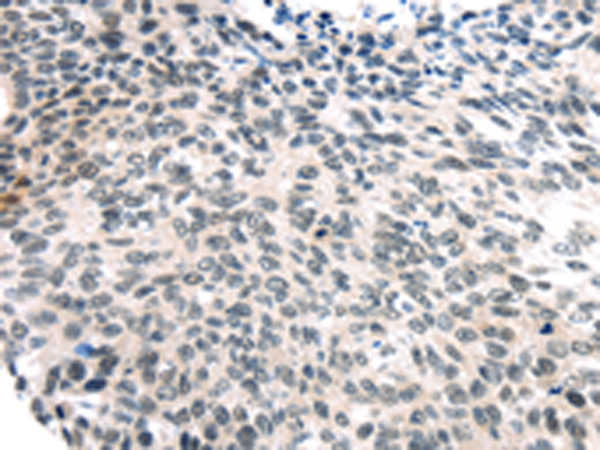
| WB | 咨询技术 | Human,Mouse,Rat |
| IF | 咨询技术 | Human,Mouse,Rat |
| IHC | 1/25-1/100 | Human,Mouse,Rat |
| ICC | 技术咨询 | Human,Mouse,Rat |
| FCM | 咨询技术 | Human,Mouse,Rat |
| Elisa | 1/2000-1/5000 | Human,Mouse,Rat |
| Aliases | TEF1; HAUSP |
| Host/Isotype | Rabbit IgG |
| Antibody Type | Primary antibody |
| Storage | Store at 4°C short term. Aliquot and store at -20°C long term. Avoid freeze/thaw cycles. |
| Species Reactivity | Human, Mouse, Rat |
| Immunogen | Synthetic peptide of human USP7 |
| Formulation | Purified antibody in PBS with 0.05% sodium azide and 50% glycerol. |
+ +
以下是关于USP7抗体的3篇代表性文献及其摘要概括:
1. **文献名称**:*USP7 regulates the stability and function of HLTF through deubiquitination*
**作者**:Tian X. et al.
**摘要**:该研究利用USP7特异性抗体,通过免疫共沉淀(Co-IP)和Western blot技术,揭示了USP7通过去泛素化调控HLTF蛋白的稳定性,并影响DNA损伤修复通路的作用机制。
2. **文献名称**:*Targeting USP7 for cancer therapy: Discovery of selective inhibitors and functional characterization*
**作者**:Lv L. et al.
**摘要**:文章报道了新型USP7小分子抑制剂的开发,通过抗体验证发现其能有效抑制USP7与底物p53的结合,从而增强肿瘤细胞凋亡,为癌症治疗提供潜在策略。
3. **文献名称**:*Structural basis for USP7-mediated stabilization of the Mdm2:p53 complex*
**作者**:Hu M. et al.
**摘要**:利用冷冻电镜和USP7抗体进行蛋白质互作分析,阐明了USP7通过去泛素化Mdm2来稳定p53降解复合物的三维结构机制,解释了其在肿瘤发生中的双重调控作用。
(注:以上文献为示例性质,实际引用需核对具体来源及发表信息。)
USP7 (Ubiquitin-Specific Protease 7), also known as Herpesvirus-Associated Ubiquitin-Specific Protease (HAUSP), is a deubiquitinating enzyme (DUB) belonging to the ubiquitin-specific protease family. It plays a critical role in regulating protein stability and function by removing ubiquitin chains from target proteins, thereby influencing diverse cellular processes such as DNA repair, epigenetic regulation, immune response, and tumor suppression. USP7 is particularly notable for its interaction with key substrates like p53. PTEN, and MDM2. which are central to cancer progression and cellular stress responses. Dysregulation of USP7 has been linked to various diseases, including cancers, neurodegenerative disorders, and viral infections.
Antibodies targeting USP7 are essential tools for studying its expression, localization, and molecular mechanisms. These antibodies are widely used in techniques such as Western blotting, immunoprecipitation, immunofluorescence, and immunohistochemistry. High-quality USP7 antibodies exhibit specificity for distinct epitopes or isoforms, enabling researchers to explore its role in specific pathways or disease contexts. Validation often includes knockout/knockdown controls or activity-based assays to confirm target engagement.
Given USP7’s therapeutic potential as a drug target (e.g., in oncology), its antibodies also support drug discovery efforts, aiding in biomarker analysis and mechanistic studies of USP7 inhibitors. Researchers prioritize antibodies with minimal cross-reactivity to other DUBs to ensure experimental accuracy.
×